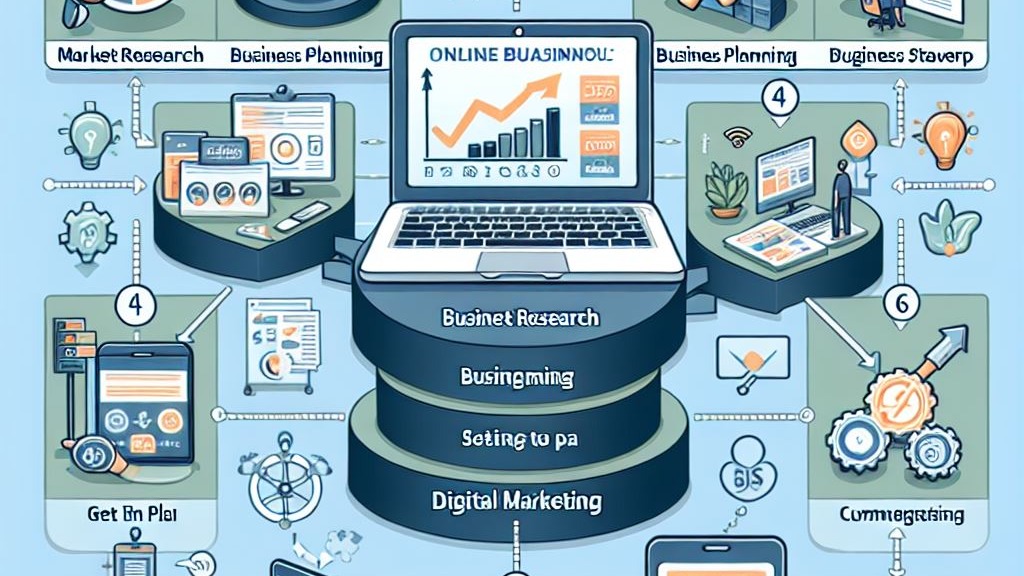Starting a successful online business can be a daunting task, but with the right guidance, it can be a rewarding and lucrative venture. In this article, we’ll provide a step-by-step guide on how to start a successful online business, covering the essential steps, tips, and best practices to help you achieve success.
Before starting your online business, it’s essential to research and validate your business idea. This involves:
-
Identifying your niche: Determine the specific area of interest or niche you want to focus on.
-
Conducting market research: Research your target audience, their needs, and preferences.
-
Analyzing competitors: Analyze your competitors, their strengths, and weaknesses.
-
Validating your idea: Validate your business idea by gathering feedback from potential customers and experts.
Step 2: Create a Business Plan
A business plan is a roadmap that outlines your business goals, strategies, and tactics. It should include:
-
Executive summary: A brief overview of your business idea and goals.
-
Market analysis: An analysis of your target market, competition, and market trends.
-
Marketing and sales strategy: A description of how you’ll market and sell your products or services.
-
Financial projections: Financial projections, including revenue, expenses, and profit projections.
Step 3: Choose an E-commerce Platform
An e-commerce platform is the foundation of your online business. Popular options include:
-
Shopify: A user-friendly platform with a wide range of customizable templates.
-
WooCommerce: A popular platform for WordPress users, offering flexibility and customization options.
-
BigCommerce: A scalable platform with built-in features and integrations.
Step 4: Register Your Business and Obtain Licenses
Registering your business and obtaining necessary licenses is crucial for legitimacy and compliance. This includes:
-
Registering your business name: Registering your business name with the state and obtaining a trademark.
-
Obtaining necessary licenses: Obtaining necessary licenses and permits, such as sales tax permits and business licenses.
-
Opening a business bank account: Opening a business bank account to separate personal and business finances.
Step 5: Develop a Marketing Strategy
A marketing strategy is essential for attracting and retaining customers. This includes:
-
Content marketing: Creating high-quality, relevant content to attract and engage with your target audience.
-
Social media marketing: Leveraging social media platforms to reach and engage with your target audience.
-
Email marketing: Building an email list and sending targeted campaigns to subscribers.
-
Paid advertising: Using paid advertising channels, such as Google Ads and Facebook Ads, to reach your target audience.
Step 6: Launch and Optimize Your Online Business
Launching and optimizing your online business involves:
-
Setting up payment and shipping options: Setting up payment and shipping options to ensure a smooth customer experience.
-
Testing and iterating: Testing and iterating on your website, marketing campaigns, and customer experience.
-
Monitoring and analyzing performance: Monitoring and analyzing performance metrics, such as website traffic, conversion rates, and customer satisfaction.
Conclusion
Starting a successful online business requires careful planning, execution, and optimization. By following the steps outlined in this guide, you’ll be well on your way to building a thriving online business. Remember to stay focused, adapt to changes, and continually improve your business to achieve long-term success.
Recommendations
-
Start small: Start small and focus on building a solid foundation for your online business.
-
Be authentic: Be authentic and transparent in your marketing and customer interactions.
-
Continuously learn: Continuously learn and improve your skills, knowledge, and business strategies.
-
Diversify: Diversify your marketing channels and revenue streams to reduce risk and increase opportunities.
-
Stay customer-focused: Stay customer-focused and prioritize delivering exceptional customer experiences.








